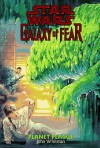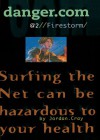Lo, the Library Awaits
I have curled up with many books over the years. Once dusty tomes, these books are now bits and bytes on digital readers or on my computer screen. No matter what the form, books are a part of my life.

This is part of Steven Pinker's explanation of language from a micro view. In his argument, the way that we construct our language is tied into how we construct our world.
You'll never look at London the same way again: "Neverwhere," Gaiman's amazing urban fantasy

In Neverwhere, Neil Gaiman's novelization of a BBC show, there are two Londons: London Above and London Below. London Above is the London we all know, the one filled with Mary Poppins and the Queen and Earl Grey tea and scones. But London Below is wholly different. It's a place where magic is real and danger lurks around every sewer bend.
Richard Mayhew, the hapless narrator, is suffering from ennui. His life is pretty good. He's got a fiancée and a respectable job, and things are progressing in the usual fashion. Even so, something is missing.
One day, he runs across an injured girl on the sidewalk. She's filthy, and no one seems to care. Even though his fiancée protests, he takes the girl to his house to clean her up and tend her wounds. Little does he know that that's the start of everything upending around him.
From that point of the book, there's everything from angels to feathered shop-keeps to a tricky, devilish marquis. In London Below, nothing can be taken at face value.
I love this book. I read it first in middle school, and it was this wonderful, eye-opening experience. I'd read a lot of traditional fantasy at this point, and I was beginning to tire of elves and orcs, but this was the first urban fantasy I'd read. Imagining the magic lurking behind the normal world was exciting, and even as I read the book today, the words enchant me and lead to me to question what's "normal."
Neil Gaiman has a way with words. His prose is both poetic and everyday, resting lightly on the page without turning purple and hard to read. For me, his other books have been hit or miss, but Neverwhere stands as a wholly accessible text, especially for a new reader to urban fantasy.
Due to the fact that Gaiman uses actual places in London to establish the world of London Below, traveling around London while reading Neverwhere is a real treat. I read the book while riding the Circle Line, and seeing the different stops, I was immediately drawn into the more fantastic elements of the world.
Scary stories for young Star Wars fans
Summer is a time of campfires, sleepovers, and scary stories shared among friends. This series, a late '90s throwback, injects the feeling of scary summer nights into the world of Star Wars.
I haven't read this series in years--years!--but I have fond memories of paging through the books and loving the cameos of Luke and the Rebellion even with the original characters introduced in the Galaxy of Fear books.
Each book has a scary-movie plot with evil in plain sight. Even reading the books as an adult, I found the books well-constructed. They weren't penned by the Bard, but they're fun.
It was these books that got me to branch off into the Young Jedi Knights series, which I read at summer camp, and then some of the later Extended Universe books.
Like with Goosebumps and other scary kid's lit, a lot of books ended in a cliffhanger or with some ridiculous non sequitur. But that was part of the charm!
"Girl from Mars," or how to kill time in Belgium with dorky romance novels

Looking through the Meyersche bookstore downtown, I found a bunch of English-language books on sale for 5 Euros each.
They were all cheesy romance books, each put out by a British company known as Little Black Dress. Normally, I would never read romance novels, instead opting for fantasy and sci-fi. That said, the books got my attention.
It's not usually my thing, I thought, but they're cheap enough to just leave on the train after I'm done.
Browsing the stacks, I could see the covers were well-designed, and each book was slim and sassy. Soon I found myself unable to pick only two books, instead buying three. The next day, I was on the train to Belgium.
The first book I read was Girl from Mars, and it was by far my favorite.
In this novel, a super-geek comic artist has made a pact with her male friends to disavow love. Even so, because she's always been seen as one of the guys, she can't divorce her interests from her need for companionship.
When a new guy comes to her office, things begin to spice up, and soon she's having to juggle her romantic feelings with her male circle. Not only that, but her art is getting noticed by bigwigs in the comic industry, which could lead to all her dreams coming true...
Being a super-geek myself, this book was a treat. There was a playfulness to the writing that I appreciated, and it had the feel of being a romance novel for people who don't like romance novels. It had the tropes, but things were so light and fun that it didn't matter.
I read this book unashamed on the train. I was sucked in completely by the story, and I arrived at my destination before I could finish. This led to reading the book on crowded buses, in my hostel, and finally on a second bus into England.
I told myself that I'd leave any book I finished on the seat as I left. I felt a little bad, though: Girl from Mars is a genuinely enjoyable book, and I wanted to take it along as a souvenir. I left it, though. Hopefully the person who found it knew English.
A year later, Girl from Mars became available on Kindle. I ordered it immediately, and it was like returning to an old friend. I could still hear the Belgian chatter and smell the leather bus seats. I could feel the rocking of the train. The memories that cling to the book are as lovely as the book itself.
Danger.com, Jordan Cray's fun and cheesy YA Internet murder mystery series from the '90s
"Surfing the Net can be hazardous to your health."
Before the age of Web 2.0 and the onset of Facebook, the Internet was text, then pictures, then the occasional lo-fi RealVideo file or MP3. At some point during all of this, author Jordan Cray decided to write a series of fast-paced murder mysteries for teens set in the wilds of the World Wide Web.
Each title in the Danger.com series is a standalone book with a different narrator. Although the mysteries and circumstances of each case differ, one thing binds them all together: the dangers of the Internet. Whether it's trusting that someone's e-mail address is their real name or entering into the wrong private chat, bad things can--and do--happen as a result of poking around too much online.
In Gemini7, the main character flirts with girls online behind his girlfriend's back and has to deal with the consequences when his online dream girl is anything but. In Firestorm, a rash of bombings is connected with a mysterious online group. In Shiver, the idea of Internet versus real-life personas comes into play as kids are attacked on an isolated mountain.
The ideas behind the books are not so farfetched from the world as we know it. For example, while the version of online dating in Gemini7 is so off-base as to be hilarious--the main character picks up girls in MUDs--the concept has roots in new technologies like online dating sites and anonymous video chats.
The books themselves are fun and ridiculous. Even as YA novels, they're bite-sized and compact, best read in one sitting. The prose isn't fantastic, but for the pulpy genre they represent, they're exciting enough. The fact that two of the five books are written from a female viewpoint is fun change of pace. Many comparable books tend to divert solely to a male protagonist.
Danger.com's depiction of the Internet is wildly antiquated today, but the core message is still there. It is dangerous to implicitly trust people online, just as it's dangerous to make assumptions in social situations. This series is a fun, bite-sized look at the '90s-era Internet as well as the world of the '90s teenager.

















